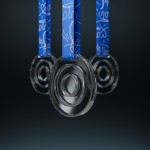Samsung showed off some new gadgets at its CES keynote, including a spherical robot assistant and glasses for augmented reality.
The company kicked things off with a robot companion the size of a tennis ball, called Ballie. The device, which comes equipped with a camera, was seen following Samsung Consumer Electronics CEO H.S. Kim around onstage at the event late Monday, even rolling into his hand when he said the phrase: “Come here Ballie.”
It was also shown rolling around someone’s home and watching them exercise in a short clip. The product was compared online to BB-8, the ball-shaped droid from the “Star Wars” franchise.
“Ballie patrols your home to keep you safe,” Sebastian Seung, Samsung’s chief research scientist, told an audience in Las Vegas. “He is a fitness assistant that gets you moving even when you’d rather lie on the couch and watch TV.”
The pet-like device is able to interact with other smart devices. The video from Samsung showed it communicating with a smart vacuum cleaner to clear up some spilled cereal.
The company did not reveal a release date or price information for Ballie.
Such personal robots have faced difficulty in the past. Vector, a cute home assistant from hardware start-up Anki, was met with much fanfare initially but the company behind it shuttered operations last year.
“Ballie is an interesting concept,” Ben Wood, an analyst at market research firm CCS Insight, told CNBC. “I fully expect domestic robots to evolve quickly over the next decade. Some consumers are already embracing devices such as robot vacuum cleaners so concepts such as Ballie are a logical next step.”
“It is hard to believe a rival such as Amazon does not have future plans to evolve its Echo product line — for example a domestic robot that could potentially be called an EchoBot,” Wood continued. “However such devices will be lightning conductors for privacy concerns and I expect Samsung’s demo to result on deeply polarised views with those who like the concept and those who loathe it.”
AR glasses
Samsung also teased a pair of augmented reality, or AR, glasses. A demonstration by the firm showed someone wearing the glasses with an exoskeleton called GEMS to perform exercises while being guided by a virtual trainer.
As with Ballie, it’s not clear when Samsung’s smart glasses will go on sale or how much they will cost.
Smart glasses, like personal robots, have also proven a mixed bag for big tech companies. Google was arguably the first big mover in the space with Google Glass, but the product didn’t fly with consumers and was discontinued in 2017. The tech giant has instead focused on enterprise applications for smart glasses.
Microsoft has taken on the space with HoloLens, a mixed-reality headset targeted at enterprise clients rather than consumers, while Snapchat owner Snap is primarily focused on consumers with its more fashionable Spectacles.
source: https://www.cnbc.com/
MARKETING Magazine is not responsible for the content of external sites.









